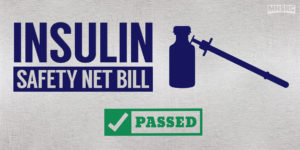The Minnesota Legislature today unanimously passed legislation that would provide insulin to those in need and implement measures to help people before they reach a crisis point.
The bill requires insulin manufacturers to provide a 30-day supply of insulin for free to individuals in urgent need but struggling to afford the life-saving drug. Additionally, patient assistance programs through drug companies, which have been questioned as too onerous and cumbersome with limited qualifications, must be made accessible and transparent with their application and approval process. The new law creates standard criteria for these assistance programs and stipulates an application must be approved or denied within ten days.
“Today is a huge victory for the countless Minnesotans who depend on insulin every single day,” said Senate Finance Committee Chairwoman Julie Rosen (R-Vernon Center). “The reforms Republicans passed last year helped most people get access to more affordable insulin, but we knew there were still gaps to close. I am proud to have served on the conference committee for this insulin bill and thrilled with the result. it doesn’t just provide assistance for people who are in an emergency situation; it also provides a path to help people avoid ever reaching a crisis point.”
In 2019, Senate Republicans instituted reforms to address the cost and emergency needs of insulin and other life-saving drugs. Pharmacies are already required to provide a 30-day supply of insulin and other life-saving drugs if a prescription runs out. Legislation in 2019 also prevents health plans from charging patients more than the wholesale cost of insulin to prevent profiteering off the drug and requires Pharmacy Benefit Managers to regularly communicate discounts and rebates with the pharmacy for the patient to use first.
The Senate is leading the fight to reduce the costs of health care and prescription drugs with innovation. In 2017, Minnesotans had limited options, fewer providers, and double-digit cost increases in the health insurance market. The Minnesota reinsurance plan stabilized the costs, opened up more options, especially for rural communities, and has become a model program for other states. In 2020, the Senate began exploring reimportation programs that would allow Minnesotans access to lower-cost drugs available in other nations. The federal government for the first time ever announced an openness to approving reimportation plans in individual states last December.

